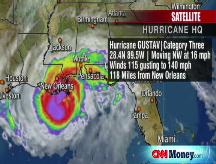Gas prices weathering Gustav - so far
Average price of gas nationwide dips on Tuesday; oil plunges in trading, gas futures also drop; Gustav damage not yet known.
NEW YORK (CNNMoney.com) -- In the aftermath of Hurricane Gustav, energy analysts say that the fate of gas prices in coming days could hinge on possible damage to the area's dozens of refineries that turn crude into gasoline.
Gas prices declined following Monday's plunge in oil prices and gas futures. But the extent of the damage from Hurricane Gustav remains to be seen.
The U.S. Department of Energy said Monday that 12 refineries have shut down and 10 have reduced their output.
"If there's no damage to refineries and they're able to get back up relatively quickly, we would assume gas prices would continue the downward trend that we've seen over the last few weeks," said Doug MacIntyre, senior oil market analyst at the Energy Information Administration, on Monday.
As it appeared Tuesday that the weaker-than-forecast Gustav would not wreak as much havoc as anticipated, oil prices plummeted by more than $7 to $108.37 a barrel, while gas futures in the wholesale market fell more than 21 cents to $2.65 a gallon.
Also on Tuesday, motorist group AAA reported that the nationwide average for retail gas prices slipped slightly, by two tenths of a cent, to $3.684 a gallon.
Peter Beutel, an analyst with energy risk management firm Cameron Hanover, expects gas prices to stay flat or fall based on the recent decline in oil prices and gas futures. But he cautioned that it's too early to tell what retail gas prices will do until the full extent of the storm's damage on oil production in the Gulf of Mexico is known.
"I'm surprised at this strong decline [in oil prices] before we even know what the damage is from the hurricane," said Beutel.
Kenneth Medlock, energy fellow at Rice University in Houston, said it will take several days before the effects of Gustav will be felt on gas prices.
After Hurricane Katrina devastated New Orleans in 2005, three days passed before gas prices spiked 10 cents a gallon in a single day. Within one week of Katrina's landfall on Aug. 29, gas prices had surged by 45 cents to $3.05 a gallon nationwide.
"If one or two refineries have any damage [from Gustav], gasoline prices will start to move up, no matter what oil prices do," said Medlock.
Already, there was some disruption. Conoco-Phillip's (COP, Fortune 500) refinery in the area normally produces 90,000 barrels of gasoline-a-day. It is one of nine refineries in the region that are temporarily closed due to Hurricane Gustav, according to oil industry analysts.
Citgo also operates a refinery. While the company says its policy is not to reveal whether facilities reduce or shutter production, Larry DeRoussel, Executive Director of the Lake Area Industry Alliance told CNN the refinery "is operating at 75% capacity."
Gas prices fell in both Louisiana and Mississippi according to AAA.
Prices rose, however, in Florida, Georgia and Alabama trumping the national average, as Tropical Storm Hannah threatens to bring heavy rain and winds to those states by the end of the week.
The price of unleaded gas has been declining steadily since hitting a nationwide record of $4.114 a gallon on July 17. But that trend broke last week as Hurricane Gustav gathered strength and moved toward the Gulf Coast.
The nationwide average for retail gas prices rose about 3 cents a gallon over the three days ending on Sunday, according to AAA. Gas prices rose dramatically in certain areas of the Gulf Coast, like the Mississippi cities of Biloxi, Gulfport and Pascagoula, where they jumped by more than 9 cents a gallon on Friday, according to AAA.
- Additional reporting by Allan Chernoff, CNN ![]()


